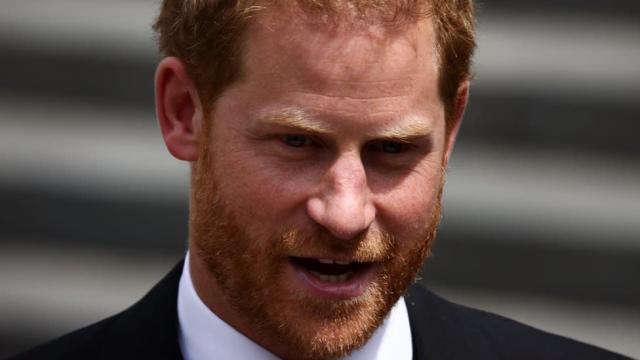By Sheila Mckenzie-
Prince Harry has began second legal case against Home Office over personal security
Lawyers claim royal should be allowed to challenge decision preventing him from paying for police protection.
The case is among five other civil cases the duke is pursuing through the courts in London, mainly in relation to allegations of hacking by the press.
Lawyers for the Duke of Sussex argue that the refusal to pay for police protection while in the UK was unlawful, his lawyers have claimed, as he launched a second legal challenge against the Home Office over his security arrangements.
At a high court hearing in London, lawyers for Prince Harry argued he should be given the go-ahead to bring a case over the decision of the executive committee for the protection of royalty and public figures (referred to in court papers as Ravec) that people should not be allowed to pay privately for their protective security.
Lawyers for the Home Office argued it was not appropriate for “wealthy people” to be able to “buy” specialist armed police protective securityd he no longer qualified for its protection after leaving for America with wife Meghan, his offer to pay for it was declined. Now he is arguing in court he should have been allowed to do so, in the same way football clubs pay for officers to maintain order at matches.
The duke’s lawyers said the decision by Ravec was inconsistent with the 1996 Police Act which allows the “chief officer of the police” to provide special police services “subject to payment”.
Harry’s renewed case is related to an earlier attempt to challenge the decision that he would no longer be given the same degree of personal protective security when visiting the UK after stepping back as a working royal and moving to the US.
Shaheed Fatima KC, defending for Harry, said the case raised an “important issue of principle”.
She said the argument relied on by Ravec, “that allowing payment for protective security is contrary to the public interest and will undermine public confidence in the Metropolitan police Service”, could not be reconciled with the fact that parliament had expressly allowed for payment for such services.
She said Ravec had not provided any principled or rational basis for drawing a distinction between the provision of protective security for those individuals within the Ravec cohort, who, according to the funding decision, “are not permitted to privately fund protective security, and other private individuals, who could privately fund protective security, by making a request to the chief officer of police”.
She told the court: “Ravec had exceeded its authority, its power, because it doesn’t have the power to make this decision in the first place.”
Matthew Butt KC, for the Metropolitan police, told the court such specialist policing exposed officers to “unique risks” and that Ravec decided what was in the public interest.
“It cannot be right that officers are expected to expose themselves to that level of risk not in the public interest but because the policing body has been financially compensated,” he said. “That can only be justified with public interest.”
In written submissions, the Met said it was “wrong for a policing body to place officers in harm’s way upon payment of a fee by a private individual”.
The judge, Mr Justice Chamberlain, asked if there was a difference between someone seeking special policing for a private event on private land, such as a festival, a celebrity wedding or football match – and that of a bodyguard.
Harry’s lawyer said it was not a case of a bodyguard, it was “protection at a particular location”.
Harry has claimed the decision by Ravec was unlawful, unreasonable, and that he was not given an opportunity to be consulted prior to the decision being made.
Robert Palmer KC, for the Home Office, said this was not about crowd control at a football match or marathon or other similar event; it was about specialist protective security for an individual.
He said Ravec’s decision was not unlawful and it was “simply the setting of a policy principle”. Archie Bland and Nimo Omer take you through the top stories and what they mean, free every weekday morning
There was legal uncertainty over whether the provision of protective security fell under the relevant section and the Police Act.
He said in written submissions: “The funding decision arose because … the claimant suggested, in connection with his first judicial review, that he was, or might be, it being unclear, willing privately to fund the protective security he sought, supplied by the Metropolitan police service.”
He added: “In essence, Ravec considered that it was not appropriate to support an outcome whereby wealthy individuals could ‘buy’ protective security from specialist police officers (potentially including armed officers), in circumstances where Ravec has determined that the public interest does not warrant that individual receiving such protective security on a publicly funded basis. That would be precisely the effect of the claimant’s claim.”
Ravec, which he said includes senior officials from the Home Office, the Met and the royal household, was not required to give Harry the chance to make representations, Palmer said.
He added: “Given the nature of the arguments now advanced by the claimant, the court can be confident that such representations would have been highly likely to have made no substantial difference in any event.”
He said the funding decision “does not preclude any individual, including the claimant, from applying to any chief officer directly and seeking to persuade them to provide protective security as a special police service.
“The fact … that the MPS has set out in its summary grounds that such an application to it would be likely to be refused is, practically, unsurprising where the MPS was represented on Ravec and agreed with the concerns of principle set out in the funding decision.”
The case is among five other civil cases the duke is pursuing through the courts in London.

